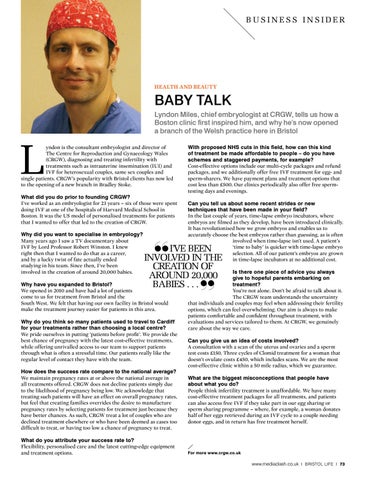BUSINESS INSIDER
HEALTH AND BEAUTY
BABY TALK
L
Lyndon Miles, chief embryologist at CRGW, tells us how a Boston clinic first inspired him, and why he’s now opened a branch of the Welsh practice here in Bristol
yndon is the consultant embryologist and director of The Centre for Reproduction and Gynaecology Wales (CRGW), diagnosing and treating infertility with treatments such as intrauterine insemination (IUI) and IVF for heterosexual couples, same sex couples and single patients. CRGW’s popularity with Bristol clients has now led to the opening of a new branch in Bradley Stoke. What did you do prior to founding CRGW? I’ve worked as an embryologist for 23 years – six of those were spent doing IVF at one of the hospitals of Harvard Medical School in Boston. It was the US model of personalised treatments for patients that I wanted to offer that led to the creation of CRGW. Why did you want to specialise in embryology? Many years ago I saw a TV documentary about IVF by Lord Professor Robert Winston. I knew right then that I wanted to do that as a career, and by a lucky twist of fate actually ended studying in his team. Since then, I’ve been involved in the creation of around 20,000 babies.
With proposed NHS cuts in this field, how can this kind of treatment be made affordable to people – do you have schemes and staggered payments, for example? Cost-effective options include our multi-cycle packages and refund packages, and we additionally offer free IVF treatment for egg- and sperm-sharers. We have payment plans and treatment options that cost less than £500. Our clinics periodically also offer free spermtesting days and evenings. Can you tell us about some recent strides or new techniques that have been made in your field? In the last couple of years, time-lapse embryo incubators, where embryos are filmed as they develop, have been introduced clinically. It has revolutionised how we grow embryos and enables us to accurately choose the best embryos rather than guessing, as is often involved when time-lapse isn’t used. A patient’s ‘time to baby’ is quicker with time-lapse embryo selection. All of our patient’s embryos are grown in time-lapse incubators at no additional cost.
I’VE BEEN INVOLVED IN THE CREATION OF AROUND 20,000 BABIES . . .
Why have you expanded to Bristol? We opened in 2010 and have had a lot of patients come to us for treatment from Bristol and the South West. We felt that having our own facility in Bristol would make the treatment journey easier for patients in this area.
Why do you think so many patients used to travel to Cardiff for your treatments rather than choosing a local centre? We pride ourselves in putting ‘patients before profit’. We provide the best chance of pregnancy with the latest cost-effective treatments, while offering unrivalled access to our team to support patients through what is often a stressful time. Our patients really like the regular level of contact they have with the team. How does the success rate compare to the national average? We maintain pregnancy rates at or above the national average in all treatments offered. CRGW does not decline patients simply due to the likelihood of pregnancy being low. We acknowledge that treating such patients will have an effect on overall pregnancy rates, but feel that creating families overrides the desire to manufacture pregnancy rates by selecting patients for treatment just because they have better chances. As such, CRGW treat a lot of couples who are declined treatment elsewhere or who have been deemed as cases too difficult to treat, or having too low a chance of pregnancy to treat. What do you attribute your success rate to? Flexibility, personalised care and the latest cutting-edge equipment and treatment options.
Is there one piece of advice you always give to hopeful parents embarking on treatment? You’re not alone. Don’t be afraid to talk about it. The CRGW team understands the uncertainty that individuals and couples may feel when addressing their fertility options, which can feel overwhelming. Our aim is always to make patients comfortable and confident throughout treatment, with evaluations and services tailored to them. At CRGW, we genuinely care about the way we care. Can you give us an idea of costs involved? A consultation with a scan of the uterus and ovaries and a sperm test costs £150. Three cycles of Clomid treatment for a woman that doesn’t ovulate costs £450, which includes scans. We are the most cost-effective clinic within a 50 mile radius, which we guarantee. What are the biggest misconceptions that people have about what you do? People think infertility treatment is unaffordable. We have many cost-effective treatment packages for all treatments, and patients can also access free IVF if they take part in our egg sharing or sperm sharing programme – where, for example, a woman donates half of her eggs retrieved during an IVF cycle to a couple needing donor eggs, and in return has free treatment herself.
For more www.crgw.co.uk
www.mediaclash.co.uk I BRISTOL LIFE I 73
